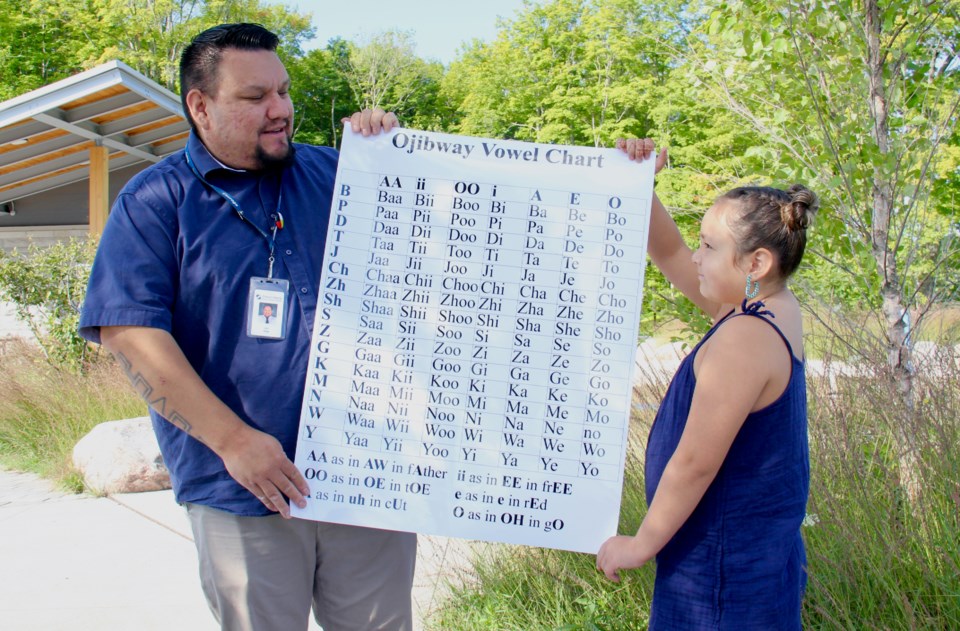Jake King is going back to school for his second year as a full-time Ojibwe language teacher with the Simcoe County District School Board (SCDSB).
“I’m doing what I love,” said King, 32.
Last year, he taught Ojibwe at Georgian Bay District Secondary School in Midland for the fall semester and at Orillia’s Twin Lakes Secondary School and Lions Oval Public School for the winter session.
“There’s not enough of me,” said King, a member of Beausoleil First Nation, who lives in Orillia.
There is a great need for Indigenous language instruction at schools and very few teachers, he said.
King recently won the Educator Excellent Award from the Anishinabek Education System for his work over the past three years as an Ojibwe language teacher and an Indigenous student advocate.
Keeping the Ojibwe language alive is his mission in life.
“It’s vitally important to keep the language and culture alive because it encompasses our entire world view. It is vital to our identity and how we interact with the world. They call it Anishinaabe bimaadziwin,” he said.
Indigenous students growing up in Beausoleil First Nation and Rama First Nation get Ojibwe language instruction from grades 1 to 8, but until recently, there hasn’t been any Ojibwe instruction at secondary schools.
Neither First Nation has a secondary school, so students have to join the urban education system, and it can be a harsh transition, said King.
King grew up on Christian Island and went to its elementary school. He moved to Barrie to attend Barrie North Collegiate Institute for high school. He didn’t graduate.
“I didn’t get the option to take Ojiwbe in high school,” he said.
“I had a hard time in high school because there were no supports for Indigenous students. We were just thrown into it, and a lot of people didn’t understand us and it (led) us to get into situations that were not ideal.”
King fell into situations of maladaptive tendencies with poverty and drugs and mental illness.
The federal government, with the residential school system, took the language and culture away from Indigenous people for generations. The Truth and Reconciliation Commission detailed the harm done.
“It was absolutely detrimental to people, causing very sad situations of addictions and poverty, and contributed to mental illness for the Indigenous people — not knowing who they are, not being allowed to speak their languages,” said King.
Because of the large gap in Indigenous language and cultural practices, there is a serious threat of Indigenous languages disappearing because the oldest speakers are dying off.
“It’s coming to a breaking point,” said King.
He took it upon himself to learn his language and culture.
“With the introduction of language and culture, and knowing who I was, I didn’t fall into those situations any longer. I could practise my culture with pride,” he said.
King finished high school as an adult and, in 2015, started Georgian College’s Anishnaabemowin and program development.
Since graduating, “I’ve been helping students that I could see (were) me at one point,” he said.
“A lot of the Indigenous students are going through a lot, either at home or with their own mental health, and add to that the pandemic. A lot of them need somebody to advocate for them. There’s not enough people like myself who know what they’ve been through and who can help guide them along.”
Following the Truth and Reconciliation document publication, the situation is turning around and Indigenous people are able to speak their languages and express themselves, King said.
“That is nothing but beneficial to Indigenous people.”
King is advocating to standardize the SCDSB's commitment to Indigenous languages. It’s especially important to offer Ojibwe language instruction for secondary schools that border First Nations, he said.
“It is a top priority for myself to advocate for Indigenous languages and culture for the students that are attending schools. It gives them a very real sense of identity and pride. It’s beneficial for their lives to know who they are,” he said.
Outside the SCDSB, King has provided language programming at Beausoleil First Nation and Moose Deer Point First Nation. He is also active with the Ogemawahj Tribal Council.
King will work at Georgian Bay District Secondary School for the fall semester.
